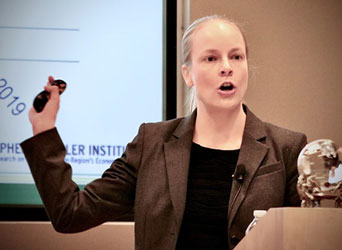
Jeanette Chapman
The economic impacts of COVID-19 are expected to devastate the world economy in ways never seen before. The Schar School’s Stephen S. Fuller Institute for Research on the Washington Region’s Economic Future is providing the policy- and decision-makers of the Washington, D.C., region with an unprecedented number of insights as they prepare for what is expected to be a lengthy economic downturn.
“The Fuller Institute is currently focused on quantifying and describing the economic effects of the pandemic in the Washington region so that regional decision-makers can take action,” said Jeannette Chapman, who was named director of the institute when founding director Stephen Fuller retired late last year.
Using sophisticated forecasting models, Chapman and the institute’s staff analyze the granular data of the area’s gross regional product, tourism and discretionary spending, the vulnerability of the region’s workforce, and the likely fates of restaurants, retailers, and service providers, among other industries.
As the research progresses, it is becoming clear that the economic impacts of COVID-19 will affect the Washington, D.C., area differently than most economic downturns.
“Typically, the presence of the federal government, which accounts for about 30 percent of our economic activity, insulates the region from business cycle downturns,” she said. “However, the current recession is not the result of economic effects tied to the business cycle, but a health crisis, and the Washington region’s economy won’t have the downside protection that it typically does.
“This recession has been unprecedented in its speed and its industrial concentration, both of which create unusual challenges,” she added. “Data that are typically used to measure recessions are no longer sufficient—they are too infrequent or too aggregated to fully reflect the situation on the ground.”
Instead, Chapman and her team are using industry-specific data and composite indices, such as the Institute’s Coincident and Leading Indices for the Washington Region, she explained.
The Fuller Institute has been cited in the media for their insights and critical research. The Washington Business Journal, Associated Press, Washington Post, US News and World Report, and Yahoo! News are a few of the many media outlets turning to the institute for unbiased, nonpartisan information.
“The Fuller Institute is the leading source of knowledge of the Washington, D.C., regional economy,” said Schar School Dean Mark J. Rozell. “Political leaders, media, the business community, and much of the general public have long relied on its analyses for projections about the economic impacts of various events, and none more so than right now during the COVID-19 outbreak.
“To understand how this health crisis is impacting business, employment, and the housing market in the region, there is no better source of research-based information than the Fuller Institute.”
